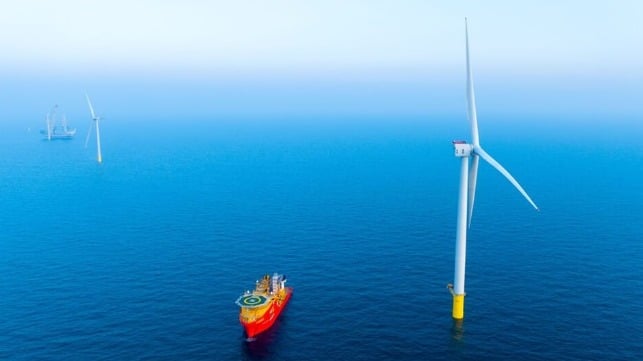Wind Turbine Blade Fails on GE Vernova Turbine at UK Dogger Bank Wind Farm

A blade on one of the wind turbines at the under-construction Dogger Bank wind farm off the coast of England failed yesterday, August 22. Details on the incident are sparse at this point and neither GE Vernova, manufacturer of the blade, nor SSE Renewables the spokesperson for the consortium behind the project are commenting.
This is the second failure of a blade at the UK wind farm although the companies blamed the prior one on a problem during installation. The wind farm however is also using the 13 MW GE Halidale-X turbines, the same manufacturing that confirmed a “manufacturing deviation,” causing a blade at Vineyard Wind 1, a U.S. offshore wind, to break apart in July.
SSE issued a brief statement saying “We are aware of a blade failure,” which it said occurred on an installed turbine at Dogger Bank A, which is located approximately 80 miles off the northern English coast. The company’s statement says there were no injuries at the time the damage was sustained and that it is working with the turbine manufacturer GE Vernova, which initiated an investigation.
A spokesperson for GE Vernova told The Maritime Executive today that the wind farm “experienced an isolated blade event that occurred during commissioning.”
It is unclear at this time if the blade fractured in a fashion similar to the one in the United States which was also undergoing commissioning when it broke. The U.S. blade broke with a small portion according to Avangrid which is developing the project falling into the ocean. Pieces of the blade and fiberglass began washing up on beaches in Massachusetts and then additional pieces of the blade broke off. More sections fell into the water, some of which sank and others were floating while additional pieces were caught on the foundation. U.S. regulators ordered all work stopped while an investigation got underway.
Vineyard Wind and GE Vernova recently reported that they had the approval to remove additional sections of the damaged blade. The operation was completed while they were also working on a recovery plan for the pieces on the tower and that sank.
GE Vernova told investors last month that it had determined the problem on the U.S. blade was a “manufacturing deviation” in the bonding of the blade during manufacture at its plant in Canada. They said it should have been caught by quality checks and they were instituting checks on all the blades from the facility. High-tech “crawlers” with cameras were being deployed into the blades at the Massachusetts wind farm while the company was reviewing all the imaging made of the blades during manufacturing.
GE Vernova declined to confirm any details about the blade that failed at the UK wind farm and if it came from the same manufacturing facility. Sources with knowledge of the situation stressed that safety is a top priority and that the company was starting an in-depth investigation while having also informed the appropriate authorities.

that matters most
Get the latest maritime news delivered to your inbox daily.
The May incident at the Dogger Bank wind farm was believed to be isolated to the individual blade and issues during the hoisting and installation. Work quickly resumed at the wind farm which is the first of three phases, each to have a capacity of 1.2 GW. Dogger Bank marked its first power generation in October 2023.
U.S. regulators last week approximately a month after the incident revised their order to permit the wind farm to resume the installation of towers and nacelles but the order does not enable further blade installation or power production at this time. Vineyard Wind started power generation early in 2024 and had become the largest operating U.S. offshore wind farm. Construction was proceeding on the project which is located 15 miles off the coast of Massachusetts with plans calling for a total of 62 wind turbines with a total capacity of 800 MW.
